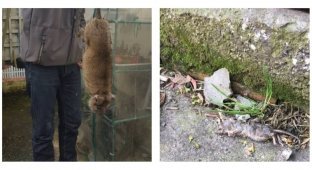Bears, thought to be extinct, have reappeared in Spain (6 photos)
Iberian brown bears once almost disappeared from Spain. 30 years ago the species was considered extinct - only 60 individuals remained. Thanks to conservation programs, there are more bears! But now another problem has appeared. 
30 years ago there were only 60 Iberian brown bears in Spain: the species was already considered extinct. However, conservation programs for bears have led to an increase in the number of individuals, and there is hope for their salvation. Now there are as many as 400 individuals of these bears in the country, and lately they have often wandered into mountain villages. The bears scare local residents with their visits and scour the surrounding area in search of food. 
The regional government of Castile and Leon has even organized a special patrol that monitors the appearance of brown bears in residential areas. The patrol is doing its best to ensure the peaceful coexistence of villagers and animals: they ask all locals to report if they have seen bears nearby. Experts recommend that residents remain calm when encountering a bear like this and immediately call rescuers. 
Residents are already complaining that they can’t just go for a walk for fear of meeting a bear. As soon as employees receive a call on the 24-hour line, they grab their radios, pellet guns and tracking devices and rush to help. Their task is to scare bears away from villages so that they do not harm people and crops.
"The increase in the population of brown bears leads to frequent clashes with people. The bears are approaching villages more often because they cannot find enough food in the mountains," says patrol coordinator Daniel Pinto. 
Thanks to increased awareness, conservation programs and compliance with conservation regulations, the Iberian brown bear population is growing. They once lived throughout most of the Iberian Peninsula, but due to hunting and habitat loss they became increasingly rare. In 1973, the brown bear received the status of a protected species, although hunting for it continued. This species is now considered endangered. 































